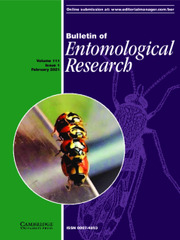Ver ítem
- xmlui.general.dspace_homeCentros e Institutos de InvestigaciónCICVyA. Centro de Investigación en Ciencias Veterinarias y AgronómicasInstituto de GenéticaArtículos científicosxmlui.ArtifactBrowser.ItemViewer.trail
- Inicio
- Centros e Institutos de Investigación
- CICVyA. Centro de Investigación en Ciencias Veterinarias y Agronómicas
- Instituto de Genética
- Artículos científicos
- Ver ítem
Remating behavior in Anastrepha fraterculus (Diptera: Tephritidae) females is affected by male juvenile hormone analog treatment but not by male sterilization
Resumen
The sterile insect technique (SIT) has been proposed as an area-wide method to control the South American fruit fly, Anastrepha fraterculus (Wiedemann). This technique requires sterilization, a procedure that affects, along with other factors, the ability of males to modulate female sexual receptivity after copulation. Numerous pre-release treatments have been proposed to counteract the detrimental effects of irradiation, rearing and handling and increase
[ver mas...]
The sterile insect technique (SIT) has been proposed as an area-wide method to control the South American fruit fly, Anastrepha fraterculus (Wiedemann). This technique requires sterilization, a procedure that affects, along with other factors, the ability of males to modulate female sexual receptivity after copulation. Numerous pre-release treatments have been proposed to counteract the detrimental effects of irradiation, rearing and handling and increase SIT effectiveness. These include treating newly emerged males with a juvenile hormone mimic (methoprene) or supplying protein to the male's diet to accelerate sexual maturation prior to release. Here, we examine how male irradiation, methoprene treatment and protein intake affect remating behavior and the amount of sperm stored in inseminated females. In field cage experiments, we found that irradiated laboratory males were equally able to modulate female remating behavior as fertile wild males. However, females mated with 6-day-old, methoprene-treated males remated more and sooner than females mated with naturally matured males, either sterile or wild. Protein intake by males was not sufficient to overcome reduced ability of methoprene-treated males to induce refractory periods in females as lengthy as those induced by wild and naturally matured males. The amount of sperm stored by females was not affected by male irradiation, methoprene treatment or protein intake. This finding revealed that factors in addition to sperm volume intervene in regulating female receptivity after copulation. Implications for SIT are discussed.
[Cerrar]

Autor
Abraham, Solana;
Liendo, María Clara;
Devescovi, Francisco;
Peralta, Patricia Angelica;
Yusef, Verónica;
Ruiz, María Josefina;
Cladera, Jorge Luis;
Vera, Maria Teresa;
Segura, Diego Fernando;
Fuente
Bulletin of Entomological Research 103 (3) : 310-317 (Junio 2013)
Fecha
2013-06
Editorial
Cambridge University Press
ISSN
0007-4853
URI
http://hdl.handle.net/20.500.12123/8735
https://www.cambridge.org/core/journals/bulletin-of-entomological-research/article/abs/remating-behavior-in-anastrepha-fraterculus-diptera-tephritidae-females-is-affected-by-male-juvenile-hormone-analog-treatment-but-not-by-male-sterilization/886AE4A1D53CDA9F21636404ADAAA50D
https://www.cambridge.org/core/journals/bulletin-of-entomological-research/article/abs/remating-behavior-in-anastrepha-fraterculus-diptera-tephritidae-females-is-affected-by-male-juvenile-hormone-analog-treatment-but-not-by-male-sterilization/886AE4A1D53CDA9F21636404ADAAA50D
Formato
pdf
Tipo de documento
artículo
Palabras Claves
Derechos de acceso
Restringido
 Excepto donde se diga explicitamente, este item se publica bajo la siguiente descripción: Creative Commons Attribution-NonCommercial-ShareAlike 2.5 Unported (CC BY-NC-SA 2.5)
Excepto donde se diga explicitamente, este item se publica bajo la siguiente descripción: Creative Commons Attribution-NonCommercial-ShareAlike 2.5 Unported (CC BY-NC-SA 2.5)

